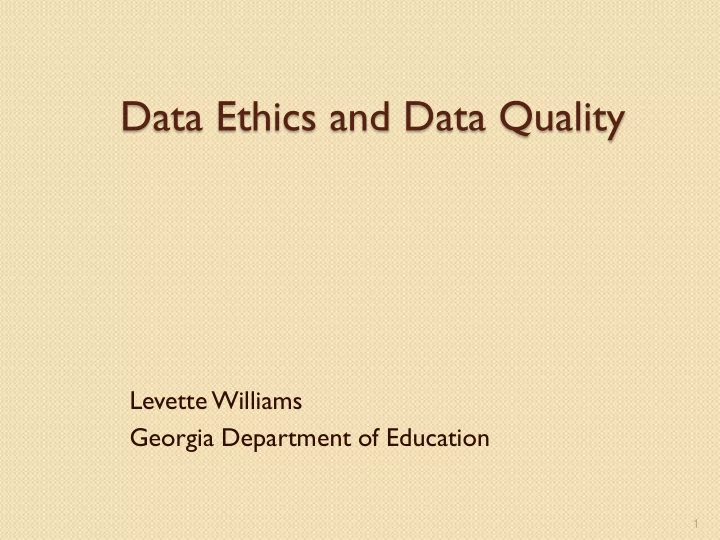

Data Ethics and Data Quality Levette Williams Georgia Department of Education 1
Session Outline Introduction to Data Ethics ◦ Integrity ◦ Data Quality ◦ Security PTAC 2
Source of Information 3
Online Course http://nces.ed.gov/forum/dataethics_course.asp 4
Introduction An education organization should ensure that all data handlers understand and adhere to ethical standards related to their responsibilities in the organization . Ethics - A set of principals of right conduct. - A system of moral values 5
Introduction ◦ Data Handlers: Anyone involved in the education enterprise who has access to education data or who contributes to the collection, management, use, or reporting education data. 6
Intended Audience ◦ Superintendents ◦ Chief information officers ◦ Data stewards ◦ Principals ◦ Technical staff ◦ Teachers ◦ Office staff ◦ Registrars ◦ Volunteers ◦ Counselors ◦ Data manager ◦ Vendors ◦ Technology Director ◦ Paraprofessionals ◦ Information system staff ◦ Program Directors ◦ ….. 7
The Foundation Honesty Integrity Professionalism Ethical Behavior
Ethical Behavior • A p ersona l tra its exp ected of ev ery one rega rd less of job title, role, resp onsibility , or Honesty function w ithin the orga niza tion. • Peop le w ith integrity w ill not chea t, lie, or stea l ev en w hen they w on’t get ca ught. Integrity • Peop le w ith integrity d o not “cherry p ick” d a ta to m isrep resent the truth. Integrity
Recommended Practices Train all data handlers in the fundamental principles of data ethics - the right and wrongs that are not legal mandates but are critical to the appropriate management and use of education data. 10
Data represents attributes of real people, they do not describe the whole person 11
Data E Ethi hics There are limits to how well data can portray people – who have complex thoughts, needs, and emotions. ◦ Data can be incorrect ◦ Data can be misleading ◦ Data cannot represent the total person ◦ Data cannot predict with absolute precision what the person will become in the future 12
Recommended Practice Be careful about making personal or professional judgments based solely on data. Be willing to challenge commonly held assumptions and prejudices related to descriptive data. Do not automatically equate school success with life success. 13
Data E Ethi hics Be aware of statutes, regulations, practices, and ethical standards governing data collections and reporting 14
Data Security Education organizations should know their responsibilities regarding protection of student data under: FERPA – Family Education Rights and Privacy Act IDEA – Individuals with Disabilities Education Act HIPAA – Heath Insurance Portability and Accountability 15
Data E Ethi hics Laws can change over time. Ignorance of a legal requirement does not cancel the obligation to meet it. 16
Data Security Privacy Technical Assistance Center (PTAC) - answers questions related to protecting student data privacy, confidentiality, and data security. ◦ State educational agencies (SEAs) ◦ local educational agencies (LEAs) ◦ the postsecondary community ◦ the early childhood community and other parties engaged with education data. ◦ http://nces.ed.gov/programs/ptac/.
Recommended Practice Train all data users in a routine and ongoing manner on relevant statutes, regulations, guidelines, accepted practices and ethical standards concerning privacy and confidentiality. Give data handlers access to professional publications to stay abreast of relevant statutes, regulations, acceptable practices, etc 18
Unethical Behavior Chicago Public Schools A Chicago high school principal and employees enrolled “ghost” students in an attempt to qualify for more staff.
Unethical Behavior DC - Data for 685 Fairfax students mistakenly posted online Personal information of hundreds of Fairfax County public school students was mistakenly posted on the school system’s Web site, exposing their student identification numbers, birth dates, home addresses and phone numbers
Integrity Report information accurately and without bias.. 21
Integrity Data can still be subject to misuse even after data quality has been established. Data can be distorted by manipulating the way it is presented. 22
23
Recommended Practices Determine whether appropriate policies, processes, and procedures are in place to report an ethical violation Require all data handlers to sign data use agreements and/or nondisclosure agreements prior to being granted access to any data files that are not already publicly available 24
Data Quality Promote data quality by adhering to best practices Provide all relevant data, definitions, and documentation to promote comprehensive understanding and accurate analysis 25
Georgia Public Education Data Reporting Demographic 2013-2014 • # of LEAs - 198 • # of Schools – 2263 • # of Students – 1,723,439 • # of data elements – 700+ • # of business rules – 1100+ • # of months data collected – 12 • # of data request processed annually - ~810 • # of helpdesk calls answered annually - ~26,000
SLDS Usage as of August 13, 2013 by Teachers
Summary Train staff about their ethical responsibilities Publicize the expectations for ethical behavior Create explicit policies and procedures pertaining to data ethics State clearly the consequences of unethical behavior Enforce these rules uniformly so that everyone is accountable 30
Thank You
Recommend
More recommend